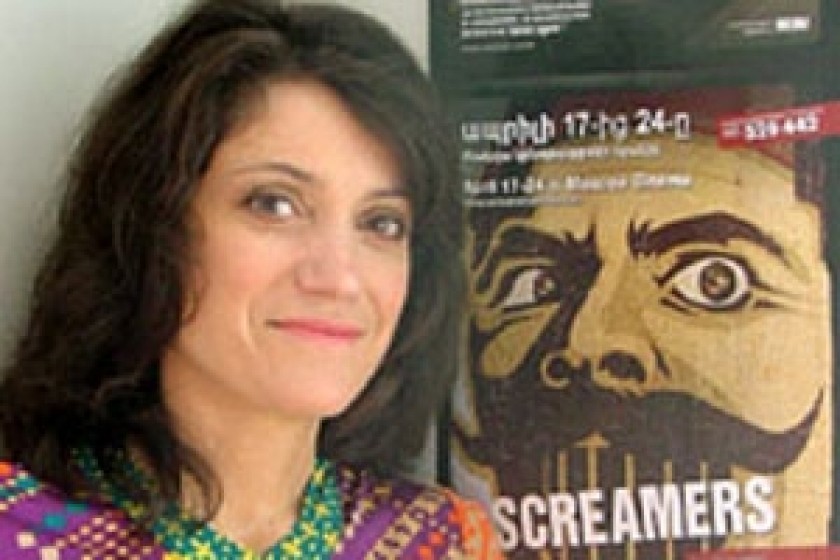
Screamers
The problem with genocide is you cannot kill them all; there are always survivors.
And those survivors become the “screamers”, the ones who cannot rest until the world knows what has happened, says Pulitzer Prize-winning Harvard Professor Samantha Power in the documentary Screamers .
Armenian American director Carla Garapedian's Screamer is not another movie about the Armenian Genocide. Here the Armenian Genocide is tied to the other massacres of the 20 th century, particularly to theDarfur's massacres, which are still going on. As long as the first genocide of the 20 th century is not recognized and condemned, genocides will go on happening, says the film.
The camera follows the American heavy metal band System Of A Down's (SOAD) concert tour throughout Europe and the USA. The musicians, themselves descendants of Genocide survivors, speak about the Genocide. The film also contains interviews with Pulitzer Prize-winning Harvard professor Samantha Power, FBI whistle-blower Sibyl Edmonds, editor-in-chief of Agos weekly Hrant Dink and others are included in the film. The grandfather of SOAD's leader Serj Tangian and other survivors of the Genocide tell their stories. Their story are interspersed with the band's music.
The film also tells about the Jewish Holocaust, and the genocides in Rwanda, Cambodia, Bosnia, and Darfur—6,000,000 dead in the Holocaust, 2,000,000 in Cambodia, 200,000 in Bosnia, 800, 000 in Rwanda, 400, 000 in Darfur and counting…
And after every massacre aUSpresident or aUKprime minister says, “We did not know, ” and “Never again.” But they knew and closed their eyes because state and personal benefit prevailed over human life. Bill Clinton knew aboutRwanda; George Bush finally called what is going inSouthern Sudan“genocide” but did not interfere, perhaps thinking that saying the word “genocide” equals doing something about it.
In Screamers , Serj Tankian and drummer John Dolmayan confront House Speaker Dennis Hastert in the Capital Rotunda and give him a letter requesting his support in getting a bill recognizing the Armenian Genocide passed in Congress. According to Vanity Fair magazine, Hastert is suspected of taking $500,000 in campaign contributions from Turks in return for blocking passage of the bill.
“This band was not made up to change the world. It was not made up to make you change your minds. It was made up to make you ask questions,” Serj Tankian says.
“It is a small documentary; you can't expect miracles. We just tried our best to get people to talk and ask questions,” said Carla Garapedian. “ When I went toTurkeyfor the first time as a journalist and was getting my visa inIstanbul, I expected the immigration officer to look at my name and exclaim, Oh, you are Armenian, and all the people around to stare at me. But it was not like that. People mostly are indifferent; they don't care. I thought we had more power.
“What we need is people to ask questions. Once the movement begins, people start to ask questions you can't go back. It is like the Chinese say: you open the window and the flies come in. I think that is what happening inTurkeynow; people are asking questions. I don't know how it will end but the government cannot go back.”
In the film, editor-in-chief of Agos Hrant Dink calls for tolerance.
“It does not mean to keep silent or to debate over the historical truth or to go for compromise,” Carla Garapedian said. “It means to understand that changes need time. The Turkish people have been fed this anti-Armenian propaganda for years and years in school, universities, media. You can't change their view in one day.
“In Turkish historian Taner Akcam's new book, he talks about Mustafa Kemal Ataturk, who supported war crime trials in 1919 until the Treaty of Sevres (The Treaty of Sevres is a peace treaty that the Allies of World War I, excluding the United States, and the Ottoman Empire signed on 10 August 1920 after World War I. The Treaty of Sevres gave recognition of the Democratic Republic of Armenia and developed a mechanism to bring to trial the criminals of barbarous and illegitimate methods of warfare... [including] offenses against the laws and customs of war and the principles of humanity). There is a quote from him in The Los Angeles Herald in 1922, saying “the people who massacred the Christian minorities.” The father of the nation himself acknowledged what happened to the Armenians! But they cannot discuss Taner Akcam's book freely. He couldn't stay inTurkeybecause he was getting death threats. Orhan Pamuk couldn't stay inTurkeybecause he said the word “genocide” once. Now we allies that we did not have before.”
The director says that it was very important to use SOAD's music in Screamers . The band is famous for touching on political and social topics in their music and for advocating recognition of the Armenian Genocide. They have numerous fans all over the world, even inTurkey, who listen to them and think about what they say.
Screamers has been shown in the United States, Great Britain, and Canada, and is going to be shown in France. It won the Audience award at the AFI film festival. In Armenia Screamers will be shown at the Moscow Cinema till April 24.
 Videos
Videos Photos
Photos
Write a comment